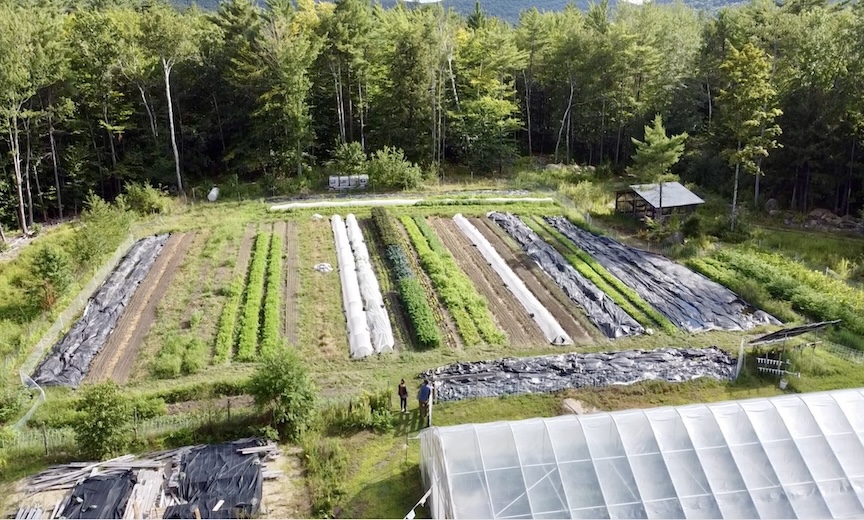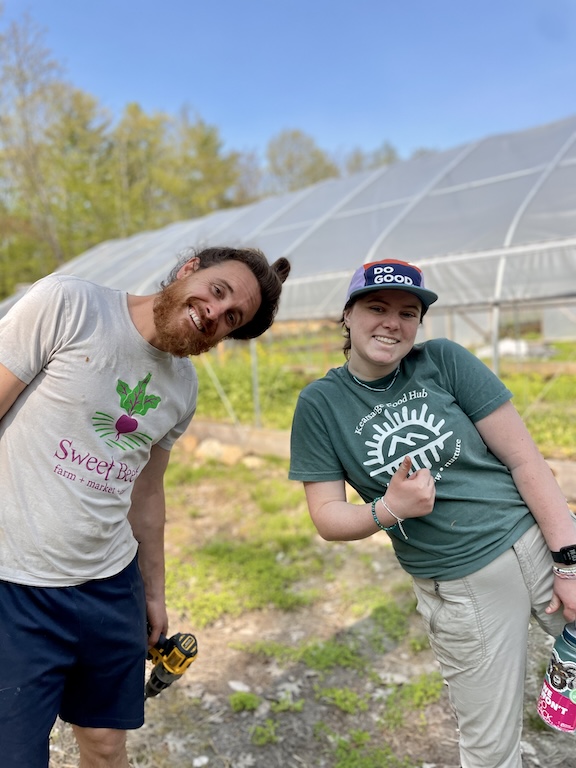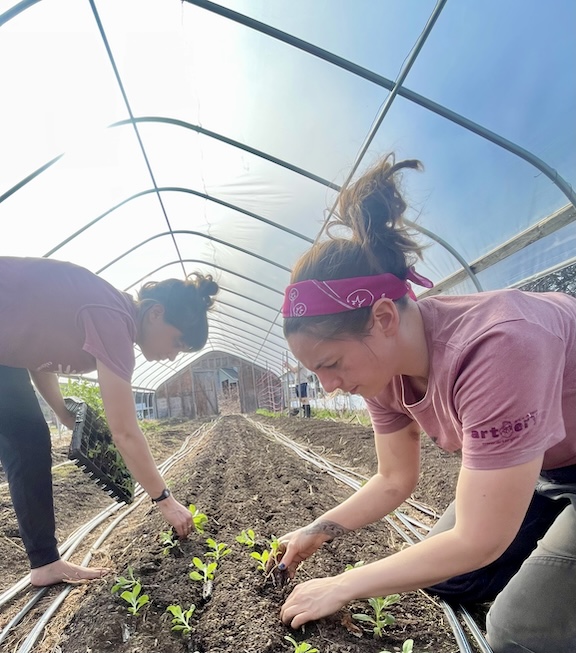By Tim King
The Kearsarge Food Hub, in Bradford, New Hampshire, will celebrate its 10th year in 2025. Since its founding as Sweet Beet Farm a decade ago it has been transforming the concept of what a food hub is.
Many food hubs center their activities on being what the United States Department of Agriculture refers to as an “aggregator.” A food hub is “a business or organization that actively manages the aggregation, distribution, and marketing of source-identified food products primarily from local and regional producers to strengthen their ability to satisfy wholesale, retail, and institutional demand,” according to the USDA’s booklet, “Running a Food Hub: A Business Operations Guide.”
The Kearsarge Food Hub sees the hub in a richer, more complex way than the USDA’s somewhat one-dimensional definition.
The physical hub itself consists of Sweet Beet Farm plus Sweet Beet Café plus Sweet Beet Market. The “plus” is important because the three enterprises each help create a synergy that is bigger than what they would be if separate and isolated.

It all started with a group of idealistic college graduates. “We were all called, in our own ways, to the same paramount challenge: to reforge a sense of community around a localized food system,” the founders, some of whom had graduated from nearby Kearsarge Regional High School, state in their online history. “We came together over meals and informal meetings, not knowing exactly where or how to begin. We reached out to local farmers, producers, and community members, and slowly things began to come into focus.”
That focus, clarified during get-togethers in the fall and winter of 2014, turned into Sweet Beet Farm in the spring of 2015.
“Several enthusiastic community members — Mike and Claire James, Rob Blank, and Chuck and Deb Spaulding — lent us small plots of land on which to grow food,” the history continues. “We did not need to take out big loans or overextend ourselves financially to start growing vegetables, which was huge for us. The people of Bradford were ready and willing to contribute to new growth in the town. Sweet Beet Farm was born.”
It was with the connection with those enthusiastic community members, and their land, that the young farmers started to weave a web of community.
Once the garden was planted, they started imagining a market stand at which to sell the produce they would harvest later in the season. The market, which opened on July Fourth of that year, was an attractive structure designed by a community member, at no cost, and built by the young farmers. With the market in place, the Sweet Beet farmers started selling their own produce as well as that of 30 some other farmers within a 30-mile radius.
Jump forward 10 years and Sweet Beet Market is now housed in a refurbished 100-year-old inn, in partnership with the building’s owners, in Bradford. The Sweet Beet Café is there, too, and the farm has moved to 50 wooded acres nearby. The Kearsarge Food Hub, encompassing all of these programs, has become a dynamic nonprofit organization.
Pierre Hahn, one of the cofounders of the food hub, is Sweet Beet Farm’s manager. He says the farm cultivates only a fraction of their total acreage and has five high tunnels and a heated greenhouse. “Even though we were only cultivating three-quarters of an acre our gross sales were around $145,000 in 2024,” says Hahn. “We focus on salad mix and other greens, root vegetables, tomatoes, eggplant, peppers, cut flowers, and other vegetables. All told, we grow about 40 different varieties of mixed vegetables.”
Permanent raised beds gardened intensively are part of the reason for the high productivity of Sweet Beet Farm, which was certified organic by MOFGA in 2024.
“Every one of our raised beds is permanent and we do our best to not disturb the soil. We are mostly no-till but, sometimes, we need tillage because of our fast bed turnover,” says Hahn.
Season extension techniques also add to the farm’s high productivity. Among those techniques are the high tunnels, which are farmed year-round. The farm also does cover cropping and mulching to protect and enhance soil health.
Hahn says that the garden, high tunnels, and greenhouse serve a role in addition to nourishing bodies through providing healthy food. Minds are also nourished at Sweet Beet Farm.
“Students of all ages come to the farm and learn about curriculum-based themes such as growing food, food as medicine, ecological learning, and nature-based self-care,” says Hahn, whose job as farm manager includes running the farm’s educational programs.
Sometimes educational programs lead to improvements in farm practices. That was the case with a 2023 Sweet Beet Farm apprentice, Anna Lick.
Lick, from Sutton, New Hampshire, became involved with the farm as a Kearsarge Regional High School student. She had learned, through a Kearsarge Food Hub employee, about the Extended Learning Opportunity, or ELO program, at the high school and nearby Parker Academy. Students from the schools can work and learn at the farm for high school credit.
Extended Learning Opportunity students can then become farm apprentices. Lick’s experience as an ELO student was her first interaction with farming. She liked what she had learned and decided to sign up for the three-month-long apprenticeship program.
The food hub’s vision is to not only grow nutritious organic produce from the rich soil at the farm but to also grow new farmers. So, apprentice Lick participated in all aspects of farm operations during 2023’s growing season. She also was integral to launching the farm’s new composting program.

The compost “utilizes food scraps from Sweet Beet Market + Café, natural farm byproducts, and animal waste from other local farms to generate nutrient-dense finished compost,” according to the food hub’s 2023 annual report. The report shared that Lick was initially “a little grossed out shoveling chicken poop,” but “things clicked when Lick saw the temperature reach 130 degrees in the compost pile she helped build.” Lick is quoted as saying, “This is just our waste but being put to good.”
The new composting program eliminates the need for purchased inputs on the farm, according to Hahn. “We make aerated static piles for our compost. We layer manure from a local dairy, potting soil from our microgreens operation, mushroom bags from our mushroom operation, food scraps from our market and kitchen, local hay grown in our town, and shredded leaves and woodchips from our woods.” In six months or less, the piles reach the required temperature and are ready to spread on the farm’s raised beds.
What Lick learned and accomplished at Sweet Beet Farm, as an ELO student and then a farm apprentice, inspired her to attend the University of Vermont to study sustainability, ecology, and policy as well as food systems. She may not become a farmer, but she will always have a keen idea of what a local and resilient food system should look like thanks to her experiences at the farm.
“The farm apprentice programs train young adults in various aspects of running a market garden with regenerative techniques,” says Hanna Flanders, a Kearsarge Food Hub cofounder. “The Kearsarge Food Hub’s farmer apprenticeship program is designed to support potential new farmers with access to land, education, markets, community, and mentorship.”

Rah Nelson, a 2024 apprentice who had experience growing vegetables, took advantage of the hub’s land access offer to explore blending flower farming with an artist’s retreat. She used the original one-fifth acre garden, now fondly called Baby Beet Farm, and the original Sweet Beet farm stand, to grow and sell flowers.
“Throughout the apprenticeship, Rah will be learning everything from seed-starting to selling, including maintaining healthy plants and soil life, harvesting, and bouquet-arranging,” the food hub wrote in Nelson’s apprenticeship announcement. “Find our Flower Farmer bouquets in Sweet Beet Market!”
Selling Nelson’s flowers at the relocated and renovated Sweet Beet Market was consistent with the founding vision of the food hub. When the founders opened the farm stand in the summer of 2015, one of the first things they did was reach out to nearby farmers and offer to sell their products at the stand.
“The farm stand was our opportunity to sell vegetables from Sweet Beet Farm and establish working relationships within the local food network,” the founders state in their history. “We began gaining trust from local farmers and producers as we helped to market and sell their products through the stand. We created our own definition of local: a 30-mile radius around Bradford. The logistics of organizing the supply within this radius has been a major source of legwork for us, but it is something we have learned is desperately needed in our area. Our suppliers grew from 10 to 20 to 30, and varied from organic vegetable growers to jam makers to meat producers.”
That 30-mile radius for suppliers wasn’t cast in stone by the founders, but it still guides the Kearsarge Food Hub today. Of the 156 suppliers in 2023, 53 of them were within that radius. Those vendors supply the market with fresh produce, eggs, baked goods, meat, seafood, maple syrup, cheese, milk, and a wide range of grocery items.
“We prioritize hyper-local farms within a 50-mile radius of our market in Bradford,” says Flanders. “Products that we source all get channeled through a food donations program that includes buying produce from local farms to send to more than seven food pantry partners and to stock our own Community FREEdge.”
Food security is an important part of the food hub’s mission and the Community FREEdge is a 24/7 food access point providing free groceries, meat, and produce to the community, no questions asked.
A FREEdge user is quoted as saying the following in the food hub’s 2023 annual report:
“I just wanted to say A GIANT THANK YOU for the free fridge. I often stop there for an 86 year old who lives in Wilmot. She is so appreciative for the goodies I bring her.”
In 2022, the food hub donated more than 18,000 pounds of food to the FREEdge and other food pantries. The majority of donated food is purchased directly from farmers or otherwise recovered from farms through a gleaning program.
The Hungry Owl Food Pantry, at Keene State College in Keene, New Hampshire, receives some of that food. A collaborative effort between college students, faculty, and Kearsarge Food Hub, the pantry provides nutritious food to students in need. Dena Shields, the advisor for the student-run Hungry Owl, a dietician, and a faculty member at the college, “notes that there’s a general lack of awareness that college students even need this kind of support,” according to the food hub’s annual report. “The belief is that if kids can afford to go to school, they can afford food. According to Dena, this is simply not true, which is why the work of the Hungry Owl is so critical.”
In addition to the FREEdge, the Hungry Owl and other food pantries, and Sweet Beet Café + Market, Sweet Beet Farm sells to Local Harvest CSA and the Concord Farmers’ Market. The spokes of a food network created by the hub radiate out from the garden and greenhouses of Sweet Beet Farm, and farms throughout the region, to the market and café. From there, they continue to reach food pantries and into college dormitories and class rooms. The farm in turn receives support from the community in the form of a robust volunteer program and fundraising efforts that are essential in fueling the food hub’s nonprofit programs.
Cofounders Hahn and Flanders say, “We see the farm as not only a place for growing food in harmony with the surrounding ecosystem, but as a gathering, nurturing, and educational space for our community.”
To learn more about Sweet Beet Farm and Kearsarge Food Hub, visit kearsargefoodhub.org.
Tim King is a produce and sheep farmer, a journalist, and cofounder of a bilingual community newspaper. He lives near Long Prairie, Minnesota.
This article originally appeared in the spring 2025 issue of The Maine Organic Farmer & Gardener.
